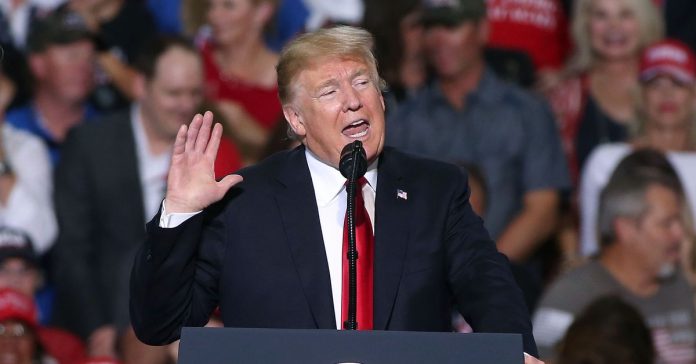July 22, 2019
The President’s Utterly Un-American Response to Dissent
John Marshall Professor of Government and Citizenship, William & Mary Law School

President Trump has vowed that four congresswomen who he has chosen as his latest foils “can’t get away with” criticizing the United States. He told reporters “I can tell you this, you can’t talk that way about the country, not while I’m president.” The House of Representatives recently took the extraordinary step of passing a resolution condemning as racist President Trump’s Twitter attacks on the “the squad,” as the group of minority female congresswomen is known. The resolution and nearly all of the commentary concerning the president’s attacks have focused on their overt racism. As pressing as this concern is, however, it has obscured another critical reason to condemn the president’s statements. This conflict, like so many others during the Trump presidency, shows that the leader of the free world does not respect the most basic free speech principle – that the people are free to disagree with their political leaders and to criticize the condition and state of the nation. The president’s claim that political dissent is “un-American” and that those who criticize public officials and policies should leave the country merits close public attention and rebuke.
The evidence that the president disrespects dissent and dissenters is overwhelming. At this point, Americans may actually have become numb to it, which may partly explain why so few are discussing this aspect of the present conflict. Among other things, President Trump has
- proposed that those who burn the flag in protest be de-naturalized and jailed;
- called political protests “embarrassing;”
- referred to the press as “the enemy of the American people;”
- blocked critics from his Twitter page (an action a federal appeals court recently concluded violated the First Amendment);
- attacked NFL players who have kneeled during the playing of the National Anthem;
- stripped security clearances from former government officials who openly criticized him;
- advocated “opening up” the libel laws so he and others can sue the media for substantial damages for “unfair” coverage;
- proposed investigating Google (for allegedly rigging its search algorithms in ways that cause the return of negative stories about him) and Saturday Night Live (for its disrespectful parodies); and
- threatened to use the antitrust and tax laws against media critics.
To be sure, the president’s objection to critical commentary is partly personal and the result of an excessively thin skin. However, there is a deeper and more serious problem. Trump appears to believe that public protest and dissent are “un-American” activities. This is why he insists on the observance of cultural, political and religious orthodoxies. He has stated that every American should “respect” the flag, participate in the National Anthem, and even greet one another during the holidays in prescribed “American” ways. To do anything else, the president has asserted, is un-American or unpatriotic. In the president’s eyes, dissenters “hate America.” And as long as he is president, no one can “get away with” political dissent.
The president’s recent outbursts fit this pattern to a tee. Members of “the squad” do not like what they have seen at the border, in the provision of health care services, with respect to our climate, and in the administration’s conduct of foreign affairs. They have used their public offices and platforms to communicate criticism and engage in robust dissent. The president has treated their dissent as grounds for expulsion from the conversation and, indeed, from the country. True, he has not taken action to remove them from the country for expressing dissent. However, his instinct to expel and exclude rather than engage his critics is profoundly at odds with venerated principles of free speech and self-government. So too is the president’s penchant for insisting on particular orthodoxies, which the First Amendment clearly bars governments – including presidents – from imposing.
In fact, it is the president’s “if you don’t like it, you can leave” response to public dissent that is deeply anti-American. Our democracy owes its very existence to dissent. Our colonial forebears protested frequently, boisterously, and publicly. The founders debated the Constitution, and criticism of their plan was widespread. None suggested that the Anti-federalists, as the most vocal opponents of the constitutional plan were known, leave the country or “go back to where they came from.” Instead, they sought to persuade the Ant-federalists and other critics of the Constitution’s merits.
The First Amendment protects public dissent precisely so that we can hold governments and officials to account. Over time, we have come to understand freedom of speech as embodying the core principle that a free people must govern itself, and that it can only do so when people criticize the status quo and engage in acts of dissent. Indeed, our founders believed it was a civic duty to raise one’s voice, confront officials on matters of public concern, and speak truth to power. We honor that legacy by barring government from making adherence to orthodoxy a condition of citizenship, the receipt of benefits, or presence in the country. We abhor censorship based on political and other viewpoints. We believe in a free speech right that includes, as the Supreme Court observed, “robust, uninhibited, and wide-open” debate on public policies.
When the president characterizes dissent as un-American, he turns his back on American history, the patriots who fought a revolution, and core free speech principles. We should condemn the president’s racist message. We should just as passionately condemn his “love it or leave it” attitude as contrary to a cherished First Amendment tradition of political dissent.
Timothy Zick, the John Marshall Professor of Government and Citizenship at William & Mary Law School, is the author of The First Amendment in the Trump Era (Oxford University Press, 2019).




